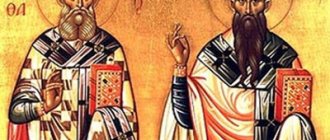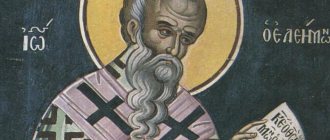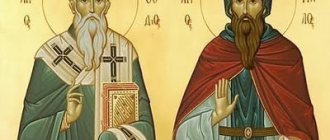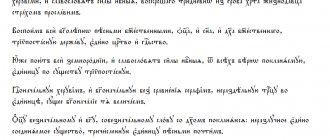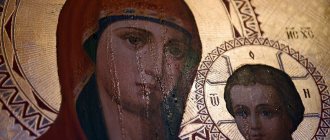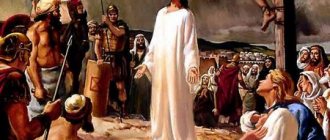Philo of Alexandria
Philon Alexandreos
| Date of Birth | 25 BC e. |
| Place of Birth | Alexandria |
| Date of death |
| School/tradition | Alexandria school |
| Influenced | platonism, stoicism |
| Influenced | Apollos of Alexandria |
Social and literary activity of Philo of Alexandria and its consequences // Andrey Goncharuk [57:39] The teaching of Philo (the Jew) of Alexandria Osipov A.I.
// mdaOsipov [1:02:39] Philo of Alexandria
(
Philo of Judaea
, Latin
Philon Alexandreos
, Greek
Φίλων ο Αλεξανδρεύς
, Hebrew פילון האלכסנדרוני) - Jewish-Hellenistic philosopher[1][2].
[edit] Biography
Born in 25 BC. e. in Alexandria, Egypt, Roman Empire.
He belonged to the noble and wealthy Jewish clan of the Alabarchs, associated with the Herodian dynasty and Roman court circles. Josephus mentions Philo's brother Alexander Alabarchus, a wealthy financier and high-ranking official whose son, Tiberius Julius Alexander, became a Roman general.
Obviously, Philo received an excellent Greek education, but was also very familiar with Jewish literature and midrash.
There is one known pilgrimage of Philo to Jerusalem.
Philo’s life is known from his work “The Embassy to Gaius,” where he described his trip to Rome as the head of a delegation of Alexandrian Jews to Emperor Caligula in the year 40 with a petition against the erection of statues of the emperor in the synagogues of Alexandria and in the Temple of Jerusalem.
Books of Philo of Alexandria - can be divided into 4 groups
Philo wrote many books. They can be divided into 4 groups:
- Historical and biographical works. This includes such works as “The Life of Abraham”, “The Life of Joseph”, “The Three Books of Moses”;
- Books about morality. This includes such as “On the Contemplative Life”, “On Nobility”;
- Political writings. Such as “About the Embassy”;
- Allegorical explanations of the Holy Scriptures for the Jews.
Many of his works are translated into Armenian.
It is also known that Philo wrote an accusatory letter “Against Flaccus.” Flaccus was then the ruler of Egypt. He became a persecutor of the Alexandrian Jews during the city unrest of 38. After the Jews staged a pogrom and wrote complaints against the emperor. Afterwards he was executed.
By leaving a comment, you accept the user agreement
[edit] Philo's teachings
Philo believes that encyclopedic knowledge is necessary to assimilate the truth. As a result, his entire system is imbued with the influence of Greek philosophy. The neo-Pythagoreans have a dualistic opposition between God and the world, finite and infinite; the influence of the Stoics is visible in his doctrine of God as the only active principle, of the divine mind inherent in the world, and of the forces emanating from God and spread throughout the world.
Philo's teaching on the Logos combines various elements of Greek philosophy. The doctrine of Logos contains elements of the Platonic doctrine of ideas, the Stoic doctrine of γενικώτατόν τι and the neo-Pythagorean doctrine of the type that existed at the creation of the world; in his “λόγος τομεός” Philo comes into contact with the Heraclitean doctrine of struggle as a driving principle.
Philo's theory of dead, inert non-existent matter agrees in its essential features with the theories of Plato and the Stoics. His idea of the creation of the world is almost identical with that of Plato; he follows Plato’s “Timaeus” almost word for word in explaining the properties of the world, which has neither beginning nor end; like Plato, he places creative activity and the act of creation itself outside of time, for, according to Plato’s theory, time begins with the world. The influence of Pythagorean philosophy is visible in his frequent use of numerical symbolism.
In Philo we also encounter the Aristotelian contrast between δύναμις and έντελέχεια[3].
In his doctrine of the soul, Philo accepts either the Stoic theory of the eight qualities of the soul, or the Platonic trichotomy of reason, courage and desire, or the Aristotelian triad of the vegetative, emotional and rational souls. The doctrine of the body as the source of all evil is fully consistent with the teaching of the Neo-Pythagoreans: he considers the soul to be a divine emanation, similar to Plato’s νοΰς. His ethics and allegories have many Stoic elements. Although, as a philosopher, F. is an eclectic, he cannot, however, be considered a compiler. He made a weapon out of his philosophy to defend and justify the foundations of the Jewish religion, which, in his opinion, are undoubted, absolute truths; philosophy is only a means to achieve a goal. With faith in the absolute authority of the Bible, and especially the Mosaic legislation, as the source of all knowledge and all wisdom, he approaches the various currents of Greek philosophy and takes from them everything that, in his opinion, is consistent with biblical truth, discarding what, according to his opinion contradicts it, for example, the Aristotelian doctrine of the eternity and indestructibility of the world.
Brought up on Greek philosophy, Philo was not, however, alien to his national literature. He read the Bible in Greek and had no doubt that the translation was completely consistent with the Hebrew original; his knowledge of the Hebrew language is evidenced by his numerous grammatical explanations of Hebrew words. His etymological explanations, it is true, are often erroneous, but they are no worse than the etymological interpretations that we find among contemporary teachers of the law.
Philo had relatively little knowledge of halakhah; As for the haggadah, his entire allegorical commentary on Genesis is nothing more than a transfer of the method of the Israeli midrash to Hellenistic soil.
Philo considers the Bible to be the source and measure of not only religious, but also any other truth. Every biblical opinion bears the stamp of divine truth; it is holy, whether it is expressed directly by God or through the mouth of the prophets, especially Moses, whom Philo considers the real exponent of divine revelation, while the rest of the biblical leaders and leaders are only disciples or friends of Moses.
Although Philo distinguishes between the words spoken by God himself, such as the Decalogue, and the laws of Moses[5], he, however, does not carry this distinction very far, recognizing in general that everything said in the Bible comes from God, even letters and signs[6].
Philo does not quote Ezekiel, Daniel, Song of Songs, Ruth, Lamentations, Ecclesiastes, Esther.
For Philo, the Bible is a source not only of religious revelation, but also of philosophical truth, for, in his opinion, Greek philosophers also borrowed from the Bible, such as Heraclitus[7] and Zeno[8].
Philo's concept of God is characterized by extreme transcendence, surpassing even Plato's: God is above virtue, above knowledge, above absolute good and beauty. According to Philo of Alexandria, at the lowest level of abstraction, goodness and other attributes are attributed to God, at the highest level of abstraction, God has no qualities, does not have a name and is unknowable. Yet, although the true essence of God is unknowable, its investigation is a supremely blessed endeavor.
Philo’s concept of man is distinguished by dualism: the spiritual principle that connects man with God, and the carnal principle that belongs to the material world. Therefore, a person inevitably faces a choice between reason and carnal life. Philo formulates this choice in terms of Stoicism as the establishment of control of reason over emotions - the ethics of the Stoics was an integral part of Philo's worldview.
Philo distinguishes two divine attributes - goodness and power
Philo distinguishes two divine attributes: goodness and power. He also explains that these elements are expressed in various names of God. Philo of Alexandria considered the divine powers to be one independent being - the Logos. He took this name from Greek philosophy, where it was first used by Heraclitus.
The name “logos” was first used by Heraclitus, and then by Philo of Alexandria.
According to Philo, all anthropomorphisms of Scripture, as well as all concrete images of God, are attributed to the powers of the Deity, and not to its essence. He is the giver of all spiritual gifts, a mediator between people and God, raising their requests to him, interceding for them before him.
Logos
translated as “mind of God”, “idea of all ideas”
The Bible views the word of God as an independently operating and existing force in its own right. Later this idea was developed in the doctrine of the divine word that created the world.
According to the teachings of Philo, all space is filled with souls. In the upper layers are the souls of angels or demons, and lower to the earth are mortal souls. The human soul is one of the divine forces, which in its original form represents angels and demons.
The human body is the source of all evil, in which the spirit languishes. The human soul awakens only for true life. It is only thanks to the body that a person experiences the feeling of hunger. But the body also brings some hardships to a person. With the help of the five senses the soul comes to understand the world.
[edit] Philo's cosmology
Philo's views on the matter from which the world is created have nothing in common with the Bible and Judaism; here he stands entirely on Greek soil. God did not create the world's matter, but found it ready-made; God could not create her, since by her nature she resists any contact with the deity.
Sometimes, following the Stoics, Philo calls God the “creative principle” and matter the “produced principle”. He probably found this concept in the Bible[9] in the image of the spirit of God moving over the waters[10].
Philo sometimes speaks of matter, like Plato and the Stoics, as something without form or attributes, but this view contradicts the assumption of the existence of four elements.
Philo considered matter to be evil on the grounds that it is not praised in the book of Genesis[11].
Philo, like Plato, may be talking about world formation, but not about creation in the proper sense of the word, since matter does not originate from God, but stands near Him as a separate, second principle. God is a demiurge and a cosmoplast. Philo often compares God to an architect who created the empirical world (κόσμος αίσθητός) according to direct intuition (κόσμος νοητός - intelligible world).
Regularity in the world is a manifestation of the coordinated actions of divine forces.
About the creation of the world, Philo says that God was prompted to do this by His goodness
About the creation of the world, Philo says that God was prompted to do this by His goodness. All good properties come only from God, and all evil is alien to him.
The soul is also considered its characteristic creation. She is a particle of the Divine mind.
The life of the soul exists and is maintained only by God.
Philo of Alexandria separated the Divine essence from the activity that manifests itself in the world, and attributed the latter to the divine forces, which he considered to be the immanent attributes of God. Between the world and the transcendental Divinity there are such powers of the Divine that form and penetrate the world - His goodness, power, wisdom.
Philo’s teaching about these forces reflects not only philosophical, but also religious traditions. From here follow the concept that the mentioned forces are pure energies of the Divine, which do not have any independence in relation to Him.
[edit] Philo, Jews and Judaism
For Jews, Philo's appeal to Greek pagan philosophy was unacceptable, which is probably why in ancient Jewish sources, with the exception of Josephus, Philo's name is not mentioned, although in some of them (for example, in several midrashim) the influence of his ideas is noticeable. Only in the 16th century did interest in the personality of Philo and his ideas appear in the book of Azariah ben Moshe dei Rossi “Meor Eynaim”.
Philo's attitude towards exegesis in Eretz Israel and the interpretation of the Law is twofold: while his method of interpretation shows the influence of Israeli midrash, he himself, in turn, influenced midrash; since many of Philo’s ideas were adopted by Israeli scientists. The Israeli halakha was apparently known in Alexandria even before Philo, where it was probably introduced by Judah ben Tabbai or Joshua ben Perachia. Philo himself had the opportunity to become acquainted with Israelite exegesis in its homeland, as he visited Jerusalem once or twice. Later teachers of the law visited Alexandria, including Joshua ben Hananiah[12]; they adopted many of Philo's ideas. Therefore, both in Philo and in the Talmud and Midrashim, one can find the same explanations of the Law and the same biblical exegeses. The only way to resolve the question of Philo’s relationship to the Israeli teachers of the law is to determine the primacy in parallel quotations. In this case, one must first distinguish between halakhah and haggadah. Halacha has its homeland in Eretz Israel, and it can be said with certainty that Philo’s interpretations, which coincide with the halakhah, were borrowed by him from the latter.
In De Specialibus Legibus, § 13 [Ι, 312], when interpreting Deuteronomy 22, 23-27, Philo says that the distinction made in the Torah between violence in the city and in the field should not be understood literally: it is important not the place where the girl was attacked, but only the circumstance of whether she called people for help and whether she could receive this help. The same motivation is given in Sifra, Deuteronomy, ad loс. — Words from Ex., 21, 13: “God allowed him to fall under his hands” — Philo explains as follows (l. p., §21 [I, 319]):
One secretly committed premeditated murder and escaped human judgment, but he will not hide from divine retribution. Another, who committed a lesser crime for which he deserves exile, also escaped from human judgment. God turns the latter into an instrument for executing the murderer and arranges for him a chance meeting with the first murderer, whom he kills unintentionally. The murderer is now punished by death, and the perpetrator of his execution will only suffer exile for his previous lesser crime.
This is the same interpretation in halakhah[13].
In De Caritate, § 14 [Ι, 394], examining Deut. 21, 10-14, Philo says that a prisoner of war should not be considered a slave if the captor does not want to marry her. The same is said in the halacha[14]: “the words לא תתעמר נה mean: do not keep her as a slave.” Philo also agrees with halakhah in motivating many biblical laws. The law given in Ex., 22, 1, according to which the owner has the right to kill the thief, Philo explains by saying that the thief breaks in with robbery purposes and will not stop before killing if he encounters an obstacle (De Specialibus Legibus, § 2 [I, 337] ). The Mishnah in Sang., VIII, 6, gives the same explanation.
It is also remarkable that Philo adopted several halakhs that have no direct basis in the Bible. Philo says, for example, in De Caritate § 5 [Ι, 304], that the marriage of a Jew with a non-Jew is prohibited, no matter what nation, although the Talmud says[15] that, according to the law of the Pentateuch[16], marriage with women of the seven Canaanite tribes is prohibited , and the extension of this prohibition to the rest of the nations is only a decree of the Sanhedrin in 18 decrees.
Philo often agrees with earlier halacha that disagrees with later ones. Discussing Deut., 21, 10-14, about a woman taken prisoner during the war, Philo in De Caritate, § 14 [I, 393] says that she should cut her nails. This explanation is the same as the earlier halakha of R. Eliezer, later halacha r. Akiba explains the words “we asetah et ziparneha” in the sense: “she must let her nails grow”[17].
In explaining the law given in Ex. 21, 18-19, Philo says in De Specialibus Legibus, § 19 [I, 317]:
If the person in question has recovered so much from the beating that he is able to walk, at least with the help of another person or with the help of crutches, then the perpetrator of the beating is not subject to punishment, even if his victim subsequently dies; for it cannot be established with certainty that his death is the result of a beating, if the beaten person recovered in the meantime.
Therefore, Philo understands the words “with the help of a crutch” literally. He interprets the words l in the same way. pp., § 2 [I, 336]: “If the sun has risen on him” (ib., 22, 2) as follows: “If the owner catches a thief before sunrise, he can kill him; later he does not have this right.”
Both of these interpretations contradict the generally accepted halakhah, which explains these biblical quotations figuratively, understanding the words “with the help of a stick” in the sense - supported by one’s own strength, and the words “if the sun has risen on him” - in the sense of “if it is clear as day that the thief is not would have killed the owner, even when the latter would have prevented him from committing the robbery”[18]. But Philo here follows an earlier halacha, the representative of which, R. [19][20], says "debarim ki ketab an" (expressions must be taken literally).
Philo reads the expressions from Ex. 21, 23-25, and Deut. 19, 21, “an eye for an eye and a tooth for a tooth” verbatim, speaking in l. p., § 33 [I, 329], which, according to the laws of Moses, has the force of leх talionis. This explanation differs from the halakhah, according to which the biblical words refer to monetary reward[21], while the earlier halakhah r. Eliezer[22] talks about the literal understanding of the expression “an eye for an eye.”
When Philo gives an interpretation that diverges from halakhah, it is mentioned in the Talmud or in halakhic midrashim as possible, but incorrect. Discussing the law from Ex. 21, 28-29, Philo says in l. p., § 27 [I, 323], that if a deliberately gory ox kills a person, then both the ox and its owner must be killed. Philo explains that the words “put its owner to death” (ib., verse 29) mean death by sentence of the court, although in certain cases the law can exempt the owner of the ox from death and impose a monetary penalty on him. The accepted halakha believes that the Torah refers to death at the hand of the Lord, but a human court can only sentence him to a penalty, without having the right to execute him for the fact that his ox killed a man[23]. But this interpretation of the halakha was not accepted by the Sadducees, since in Mech., l. pp., and in the Talmud, l. With. regarding this interpretation it is said: "It is possible that the quotation actually means that the owner of the ox should be sentenced to death by a human court." From this remark, as well as from Sang., I, 4, it follows that the Sadducean norm held the same opinion as given by Philo, and only subsequently, as can be seen from Sang., l. s., it was rejected.
Not all of Philo's interpretations that diverge from accepted halakhah are from early halakhah; many of them were compiled according to the rules of the Alexandrian court and its interpretation of the Torah. They were at odds with Israeli halakha, which was generally critical of Alexandrian jurisprudence. Regarding aggadic exegesis, it cannot be said that wherever Philo’s ideas converge with Palestinian ones, the latter were the sources of his views. While in many cases it is possible to borrow from the Palestinian haggadah, in many others it can be said with certainty that the Palestinians took from Philo ideas that could have originated in Hellenic soil. For example in Beresch. r., VIII, 1, a quotation from Gen., 1, 27 is interpreted in the sense that God originally created man as Androgynos, and this interpretation was first given by Philo when considering the same text De Opificio Mundi, § 24 [I, 17 and more clearly in De Allegoriis Legum, II, 4 [II, 49]. Also, the idea expressed in Beresch. r., XIV, 3, about the dual character given to man by God at his creation - divine and earthly, was borrowed from F., who was the first to express it (De Opificio Mundi, § 12 [Ι, 49-50]). An obvious borrowing from Philo is the passage from Schem, r., XXVI, 1, where it is said that the name Moses means water; Philo derives the word Moses from the Egyptian word "mos" - water. In many cases it is impossible to establish whether there was borrowing from one side or the other, and it would be most correct to allow the independent appearance of the same views both in Palestine and in Alexandria. Some identical rules of hermeneutics were also probably independently found and formulated as consequences of the same line of thought. So, for example, Philo formulates the principle of a deeper meaning hidden behind repetitions (De Congressu Eruditioniis Gratia, § 14 [I, 529]; the same rule is formulated by R. Akiba [24]. Philo further says that in the Bible There is not a single superfluous word, and a word that seems superfluous needs to be interpreted. Based on this rule, he explains the superfluous word in Ex. 21, 12. The same rule is also found in Akiba[25].
According to Philo, there are only three ways to the divine path
According to Philo, there are only three ways to the divine path:
- teaching;
- practice;
- natural kindness.
A person who follows this teaching experiences a certain attraction and hope. This is clearly illustrated by the example of Enoch. Abraham himself was a fan of this teaching. The student must go through three stages:
- Stage 1 includes subjects such as physics and natural science. Abraham went through this stage when he was in Haran. At this time he was a natural physiologist. He realized that the knowledge he had was not enough for him. That is why he went to Haran to turn to the study of the spirit.
Abraham realized that the knowledge he had was not enough for him. After this, he went to Haran to turn to the study of the spirit
- Stage 2 - the path of practice. Here a person strives to achieve the highest good. The preliminary point here will be a change in understanding and a departure from sensory life. On this path you may encounter temptations that you will have to fight.
- Stage 3 - virtue. This will not be considered a reward for the tests that have been passed. Noah stands at this level. He was glorified, but not one of his good deeds was mentioned. In such a person there is a state of peace and bliss.
[edit] Influence on Christianity
The philosophy of Philo largely influenced the formation of the philosophy of Neoplatonism and, mainly, Christianity. For Christian scholars, Philo's work served as a fundamental example of the synthesis of Jewish and Greco-Roman thought, and his concept of Logos formed the basis of the Christian teaching about Jesus Christ as a mediator between God and man.
The authority that Philo enjoyed among Christians is shown by the legend of his meeting with the apostles Peter and John.
Although the question of the influence of Philo's ideas on the Gospel of John has not been sufficiently studied, the letters of the Apostle Paul, primarily his Epistle to the Hebrews, show stylistic and ideological similarities with the works of Philo. Philo had a great influence on the church fathers, especially Clement of Alexandria, Origen and Ambrose of Milan, who borrowed many of his ideas and his allegorical method of biblical exegesis.
[edit] Proceedings
- De Aeternitate Mundi
- De Abrahamo
- De Migration Abrahami
- De Mutatione Nominum
- De Plantatione
- De Agricultura
- De Confusione Linguarim
- De Congressu Eruditiones Gratia
- De Decalogo
- De Sacrificius Abelis et Cainis
- De Posteritate Caini
- De Ebrietate
- De Escreationibus
- De Fuga et Inventione
- De Gigantibus
- De Josepho
- De Opificio Mundi
- De Vita Contemplativa
- De Vita Mosis
- De Sobrietate
- De Somniis
- De Specialibus Legibus
- De Virtutibus
- De Praemiis et Poenis
- Legum Allegoriae
- Legatio ad Gaium
- In Flaccum
- Quaestions in Genesim
- Quaestions in Exodum
- Quis Serem Divinarum Heres Sit
- Quod Deterius Potiori Insidari Soleat
- Quod Deus Sit Immutabilis
- Quod Omnis Probus Liber Sit
PHILO OF ALEXANDRIA
(Φίλων Ἀλεξανδρεύς) (late 1st century BC - early 1st century AD) - Judeo-Hellenistic philosopher, theologian and exegete.
BIOGRAPHICAL INFORMATION. Philo belonged to one of the richest and most influential Jewish clans in Alexandria. The only reliable date from his life is the summer of 39 AD, when he led an unsuccessful delegation of representatives of the Alexandrian Jewish community to Emperor Gaius Caligula ( Josephus
. Jewish Antiquities XVIII 257–60); he himself writes about this in his work “On the Embassy to Guy.” It is known that at this time he was already an elderly man, so it is traditionally believed that he was born c. 15/20 BC According to Josephus (XX, 100), Philo’s brother was “the richest man in Alexandria,” and his son Tiberius Julius Alexander (Philo’s nephew) was procurator of Judea in 46 AD; later, under Nero, he became prefect of Egypt. In two treatises (“On Providence” and “Do Animals Have Reason”), Philo answers the questions of his nephew, who was completely “romanized” and, according to Josephus, “betrayed the customs of his ancestors” (loc. cit); in his “conversations” with his uncle Tiberius adhered to views close to the teachings of the New Academy.
EDUCATION. Philo went through all the stages of basic Greek education (ἐνκύκλιος παιδεία), which was received by young people from good families (see De congressu, 74–79). His works show knowledge of the philosophical teachings of Middle Platonism
,
Stoicism
and
Pythagoreanism
(the latter, probably due to familiarity with the writings of Eudorus of Alexandria), as well as Greek literature. Among the most significant texts for Philo are Plato's dialogues, and above all the Timaeus, as well as the Phaedrus, Phaedo, and key passages from the Theaetetus, Symposium, Republic, and Laws. The choice of dialogues and the extent of their use demonstrate that he was fully involved in the problems of contemporary Platonism. He quotes a lot, often from memory. However, at a certain stage of his education, Philo experienced a semblance of conversion, a rediscovery of the values of his culture and traditions. This discovery led to quite unique results: instead of abandoning Greek culture and philosophy, he used it to interpret the Jewish Scriptures. It is noteworthy that ignorance of the Hebrew language also bore philosophical fruit and led him to a completely original interpretation of many passages of the Greek translation of Scripture (Septuagint).
ESSAYS. Philo was a prolific writer; the corpus of his surviving texts includes 50 works, which can be divided into three groups: 1) philosophical treatises, in which Philo largely relies on the Greek philosophical tradition (“On the Eternity of the World”, “On Providence”, “Do Animals Have Reason”, “ About virtues”, “That every virtuous person is free”); 2) historical and apologetic works in which Philo defends Judaism from contemporary critics (“Against Flaccus”, “On the Embassy to Gaius”, “Apology of the Jews”); 3) commentaries on the Pentateuch – the main part of Philon’s corpus (41 works).
EXEGETIC METHOD. Among Philo's predecessors in the interpretation of Jewish Scripture is Aristobulus of Alexandria.
. It is also possible to compare Philo's exegesis of the Bible with the Stoic and Pythagorean exegesis of the most authoritative text of Greek culture - the poems of Homer; just as Greek exegetes saw philosophical truths behind the descriptions of battles, shipwrecks and homecomings, so Philo, who studied the Greeks, saw the truths of Greek philosophy behind the text of the Pentateuch.
Philo developed an extensive exegetical scheme. First, he wrote a series of treatises, the first of which is devoted to the creation of the world (Περὶ τῆς κατὰ Μωυσέα κοσμοποιίας, Latin De opificio mundi) and followed by the lives of the patriarchs, including the lives of Moses, as examples of “living laws” (these biographies are very reminiscent of the legends about the life of Pythagoras). They were followed by a series of works on the Ten Commandments and individual laws, which ended with the treatise On Rewards and Punishments (De praemiis et poenis). Secondly, Philo undertook a consistent and literally line-by-line interpretation of the Book of Genesis. This exegesis begins with the first three books of the “Allegories of Laws”, then, after a short break, continues with the treatise “On the Change of Names” άζονται, De mutatione nominum) – commentary on Gen. 17:1–22. The treatise “On Dreams” in 3 books, of which two have survived, is thematically adjacent to the previous one and is devoted to the interpretation of the dreams of Jacob (1st book), Joseph, Pharaoh, baker and butler (2nd book). Finally, the third successive series of treatises, which is fully preserved only in the medieval Armenian translation, includes interpretations in the form of “questions and answers” on the Books of Genesis and Exodus. Many of Philo's other treatises are devoted to the exegesis of specific passages of Scripture.
THEOLOGY. Philo's theoretical philosophy is reconstructed on the basis of his exegetical works. His philosophical system is theocentric. God is seen as true being (ὄντως ὄv), - there is an obvious connection with Platonism, but the main source for Philo is primarily the biblical “I am who is” (ἐγώ εἰμι ὁ ὤν) (“Exodus” 3:14). Philo strictly distinguishes between the essence of God and his power (δύναμις) manifested in creation. He claims that every person can conclude the existence of a creator God from his experience of contemplating the order of the natural world; but knowledge of the divine essence lies beyond the limits of the human mind (even such as the prophet Moses). In His essence, God is unknowable, unnameable, indefinable and inexpressible. According to Philo, the highest Deity – Jehovah of the Pentateuch of Moses – is the absolutely transcendental “Existing God” to the world, above the Good, the One
, or Monads (see, for example, De vita contemplativa, 3). The Monad is only the “incorporeal image of God” (De somn. I, 6). Chronologically, such an idea is found in the history of ancient philosophy for the first time, however, as J. Dillon notes (The Middle Platonists, p. 155–156), this can be considered as indirect evidence that such ideas were in use among Platonists, at least since the time of Eudorus of Alexandria.
While remaining transcendent, God is connected to the cosmos as its creator and providential ruler. According to Philo, the two main names of Jehovah - “God” and “Lord” - indicate two corresponding powers (δυνάμεις): the first denotes his creative power (Philo derives the word θεός from τίθημι), the second (κύριος) - his power. Doctrine of the Divine Logos
is intended to explain how God is related to everything that is not himself.
Together with Sophia (“the mother of all things”) and Justice, which resembles the indefinite pair of the Pythagoreans, Dike, the assistant of Zeus and the Old Testament Wisdom, the transcendental God gives birth to the Son and his most perfect creation - the Logos-Word (Fug. 109). Logos is the “instrument” and active element of God’s creative thought, the “place” where ideas are located. It is this Logos-Word that first creates two higher powers - Good and Power, and then - the spiritual and material world and man. Thanks to his activity, ideas-potency (λόγοι σπερματικοί, cf. Stoic “seed logoi”), in turn, manifest themselves and, under the control of the Logos, create the world. The concept of logos carries within itself both immanent (the presence of a deity in the world created by him) and transcendental meaning, and then logos appears in Philo as a synonym for the intelligible world and divine nature.
Philo is not entirely clear about the ontological status of matter - whether it was created by God or existed before creation. He does not discuss this issue in his commentary on Genesis. Probably, Philo remained within the framework of the universal Greek axiom “out of nothing nothing comes” and, unlike early Christian thinkers, was not ready to develop the doctrine of creation ex nihilo.
Philo's ETHICS is based mainly on two texts from the Book of Genesis, Gen. 1:26–27 and Gen. 2:7, which are interpreted primarily in Stoic and Platonic terms. Man was created “in the image of God” (κατὰ εἰκόνα θεοῦ), which means: in the image of God the rational soul of man, his immortal part, was created; according to the second text, the creation of man is completed by imparting divine “breath” (πνεῦμα) to the human body. The goal of earthly human life is considered by Philo in accordance with the famous formula of Plato and the Platonists as “likening to God” (ὁμοίωσις θεῷ), and this “likening” means “knowledge of God.” But what can be considered as the ultimate goal - knowledge of the divine essence - is fundamentally unattainable, because then likening would turn out to be identification, which is impossible in the case of the creator and his creation.
The goal that a person can achieve in this life is to become wise (σοφός). The path to the highest ethical ideal of the sage (which is distinguished by “dispassion” (ἀπάθεια), and not simply “moderation”) lies through the manifestation of natural noble inclinations, education and exercise (ἄσκησις). Philo personifies the highest ideal in the image of Moses. On the path to the ideal, various virtuous states are possible, which Philo builds hierarchically and explains with the help of biblical images: “ascetic” virtue (“the virtue of Jacob”) stands below the virtue based on education (“the virtue of Abraham”), and above both of them stands “ the virtue of Isaac,” flowing from God’s blessed nature.
INFLUENCE. Having been rejected by Judaism, Philo's views had a huge influence on the formation of Christian philosophy, and above all on the exegetical method and theological views of the first Christian philosophers - Clement of Alexandria
and
Origen
. It can be argued that Clement and his circle deserve the credit for preserving Philo's literary heritage. It is in the so-called At the “Alexandrian preparatory Christian school”, founded by the legendary Panten, Philo’s thought found new life (see the works of A van den Hoek, D. Runia), becoming a kind of connecting link between Hellenistic Jewish and Christian philosophy.
Essays:
1. Philonis Alexandrini opera quae supersunt, rec. J. Cohn et P. Wendland, t. 1–7. Berolini, 1896–1915 (repr. 1962–63);
2. Philo, Works in 12 vols., engl. transl. by F. H. Colson, G. H. Whitaker, R. Marcus. Cambr. (Mass.), 1929–53 (Loeb).
3. Russian Transl.: About the contemplative life. – In the book: Smirnov N.P.
Therapists and Philo’s essay “On the Contemplative Life.” Kyiv, 1909;
4. Against Flaccus. About the embassy to Guy, trans. O.L. Levinskaya. – In the book: Flavian Library, vol. 3. M., 1994, p. 13–112.
Literature:
1. Ivanitsky V.F.
Philo of Alexandria: life and review of literary activity. Kyiv, 1911;
2. Losev A.F.
History of ancient aesthetics. Late Hellenism. M., 1980, p. 82–128;
3. Wolfson H.A.
Philo: Foundations of Religious Philosophy in Judaism, Christianity and Islam, v. 1–2. Cambr. (Mass.), 1962;
4. Mayer G.
Index Philoneus. V., 1974;
5. Dillon J.
The Middle Platonists. L., 1977, 2 ed. 1996 (ch. 3);
6. Runia D.T.
Philo of Alexandria and the Timaeus of Plato. Leiden, 1986;
7. Idem.
Exegesis and Philosophy: Studies on Philo of Alexandria. Hampshire, 1990;
8. Idem.
Philo in Early Christian Literature. Assen, 1993;
9. Radice R.
,
Runia D. T.
Philo of Alexandria: An Annotated Bibliography 1937–1986. Leiden, 1988;
10. Hoek van den A.
The "Catholic" School of Early Alexandria and its Philonic heritage. – Harvard Theological Review 90, 1997, p. 56–87.
E.V. Afonasin
,
M.A. Solopova

